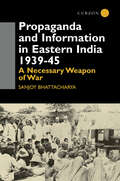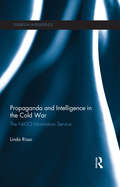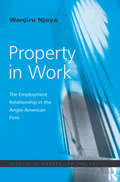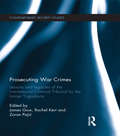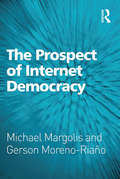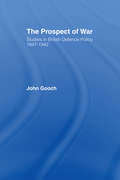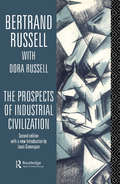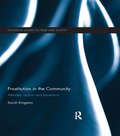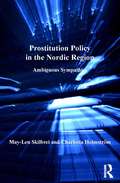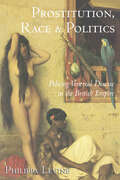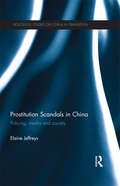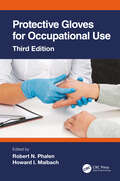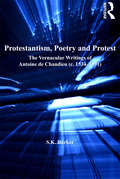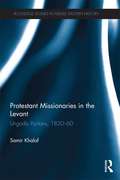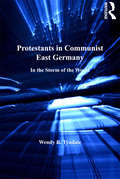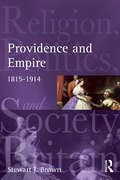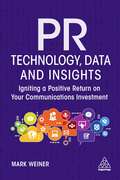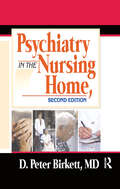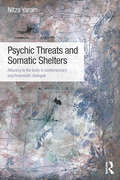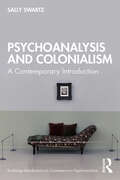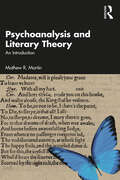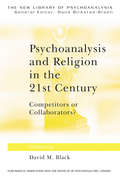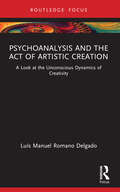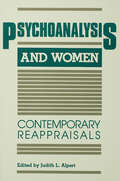Special Collections
Benetech’s Global Certified Accessible Titles
Description: Benetech’s GCA program is the first independent third-party EPUB certification to verify ebook accessibility. By creating content that is born accessible, publishers can meet the needs of all readers. Learn more: https://bornaccessible.benetech.org/
- Table View
- List View
Propaganda and Information in Eastern India 1939-45
by Sanjoy BhattacharyaThis is a study of the social, political, economic and public health aspects of the Second World War in South Asia, with particular attention being accorded to colonial Eastern India, which was treated as a single administrative unit during the course of the conflict for strategic purposes. The conclusion deals with the long term effects of the war: its effects on political formations, bureaucratic re-negotiation and the de-colonisation of the British Indian empire.
Propaganda and Intelligence in the Cold War
by Linda RissoThis book offers the first account of the foundation, organisation and activities of the NATO Information Service (NATIS) during the Cold War. During the Cold War, NATIS was pivotal in bringing national delegations together to discuss their security, information and intelligence concerns and, when appropriate or possible, to devise a common response to the ‘Communist threat’. At the same time, NATIS liaised with bodies like the Atlantic Institute and the Bilderberg group in the attempt to promote a coordinated western response. The NATO archive material also shows that NATIS carried out its own information and intelligence activities. Propaganda and Intelligence in the Cold War provides the first sustained study of the history of NATIS throughout the Cold War. Examining the role of NATIS as a forum for the exchange of ideas and techniques about how to develop and run propaganda programmes, this book presents a sophisticated understanding of the extent to which national information agencies collaborated. By focusing on the degree of cooperation on cultural and information activities, this analysis of NATIS also contributes to the history of NATO as a political alliance and reminds us that NATO was – and still is – primarily a political organisation. This book will be of much interest to students of NATO, Cold War studies, intelligence studies, and IR in general.
Property in Work
by Wanjiru NjoyaThe notion of property in work has deep historical roots in the common law tradition, but is yet to receive the attention it deserves. In this timely and thought-provoking book, Wanjiru Njoya contrasts ideas of ownership and property rights in English, American and European labour law, and considers their practical implications. The author's contention that shared ownership within a stakeholder theory of the firm allows better protection of both shareholders' and employees' interests in the large public corporation, puts employee-participation firmly back on the corporate governance agenda. The book offers a refreshing new perspective on how a more socially desirable balance between economic flexibility and job security may be achieved.
Prosecuting War Crimes
by Rachel Kerr and James Gow and Zoran PajićThis volume examines the legacy of the International Criminal Tribunal for the former Yugoslavia (ICTY), which was created under Chapter VII of the UN Charter as a mechanism explicitly aimed at the restoration and maintenance of international peace and security. As the ICTY has now entered its twentieth year, this volume reflects on the record and practices of the Tribunal. Since it was established, it has had enormous impact on the procedural, jurisprudential and institutional development of international criminal law, as well as the international criminal justice project. This will be its international legacy, but its legacy in the region where the crimes under its jurisdiction took place is less clear; research has shown that reactions to the ICTY have been mixed among the communities most affected by its work. Bringing together a range of key thinkers in the field, Prosecuting War Crimes explores these findings and discusses why many feel that the ICTY has failed to fully engage with people’s experiences and meet their expectations. This book will be of much interest to students of war crimes, international criminal law, Central and East European politics, human rights, and peace and conflict studies.
The Prospect of Internet Democracy
by Michael Margolis and Gerson Moreno-RiañoThe internet opens up new opportunities for citizens to organize and mobilize for action but it also provides new channels that established political, social and economic interests can use to extend their powers. Will the internet revolutionize politics? The Prospect of Internet Democracy is a rich and detailed exploration of the theoretical implications of the internet and related information and communication technologies (ICTs) for democratic theory. Focusing in particular on how political uses of the internet have affected or seem likely to affect patterns of influence among citizens, interest groups and political institutions, the authors examine whether the internet's impact on democratic politics is destined to repeat the history of other innovative ICTs. The volume explores the likely long-term effects of such uses on the conduct of politics in the USA and other nations that declare themselves modern democracies and assesses the extent to which they help or hinder viable democratic governance.
The Prospect of War
by John GoochFirst Published in 1981. Routledge is an imprint of Taylor & Francis, an informa company.
The Prospects of Industrial Civilisation
by Bertrand Russell and Dora RussellThe Prospects of Industrial Civilization provides a rare glimpse into areas of Russell's political thought which are often ignored. Written with Dora Black (who became Russell's second wife) on a trip to China in 1920, it is revealing both as a period piece and as a book for our times. Russell criticises his own age, and demonstrates how humanity perpetually struggles against the centralising forces of industrialism and nationalism. He views industrialism as a threat to human freedom, as it creates large populations which have to be subject to controls and he likens Bolshevik Russia to Cromwell's England, asserting that both were dictatorships designed to force an essentially feudal society to adopt industrialism. He sees industrialism and nationalism as fundamentally linked and proposes one government for the whole world as a solution. Russell is not blind to the positive side of industrialism; without machines an economy of subsistence would be the best for which society could hope, but argues that the global village and prevailing political democracy should be its eventual results.
Prostitution in the Community
by Sarah KingstonProstitution often causes significant anxiety for communities. These communities have been known to campaign against its presence in ‘their’ neighbourhoods, seeking the removal of street sex workers and their male clients. Although research and literature has begun to explore prostitution from the standpoint of the community, there is no comprehensive text which brings together some of the current literature in this area. This book aspires to cast light on some of this work by exploring the nature, extent and visibility of prostitution in residential communities and business areas, considering the legal and social context in which it is situated, and the community responses of those who live and work in areas of sex work. This book aims to examine current literature on the impacts of prostitution in residential areas and considers how different policy approaches employed by the police and local authorities have mediated and shaped the nature of sex work in different communities. It explores what communities think about prostitution and those involved, as well as studies the techniques and strategies communities have utilized to take action against prostitution in their neighbourhoods. This book will also demonstrate the diversity of public attitudes, action and reaction to prostitution in the community. This book is a useful contribution for academics and researchers in the fields of Criminology and Sociology who wish to understand current policy initiatives surrounding the issue of prostitution in local, national and international community settings.
Prostitution Policy in the Nordic Region
by May-Len Skilbrei and Charlotta HolmströmThere is great interest internationally in the development of prostitution policies in the Nordic countries after Sweden, Norway and Iceland have introduced general bans against buying sex whilst selling sex remains legal. In addition, there is a partial ban against buying sex in Finland. This is a different approach from that of several other European countries, where we have seen a decriminalisation of third-party involvement in prostitution as well as to that of the USA which criminalises both the buying and selling of sexual services. Thus the Nordic countries are often treated as representatives of a 'Nordic model' of prostitution policies. In this book - the first on the subject - Skilbrei and Holmström argue that these models of policies or policy regimes tend to ignore the trajectories, contexts and consequences of the full range of approaches to prostitution, thus they are too simplistic and static. Prostitution policies in the Nordic countries are multifaceted and dynamic, and cannot be represented as following a straight path and detached from empirical contexts. Their analysis treats Nordic prostitution policies both as a product of history, of current national and Nordic debates, and of international obligations and changes in the international and national prostitution markets. Furthermore they argue that a broad understanding of the relevant context is necessary so as to place Nordic prostitution policies within broader policy concerns related to gender, class, ethnicity, sexuality, social welfare, immigration and organised crime, as well as to neoliberal forms of governance.
Prostitution, Race and Politics
by Philippa LevineIn addition to shouldering the blame for the increasing incidence of venereal disease among sailors and soldiers, prostitutes throughout the British Empire also bore the burden of the contagious diseases ordinances that the British government passed. By studying how British authorities enforced these laws in four colonial sites between the 1860s and the end of the First World War, Philippa Levine reveals how myths and prejudices about the sexual practices of colonized peoples not only had a direct and often punishing effect on how the laws operated, but how they also further justified the distinction between the colonizer and the colonized.
Prostitution Scandals in China
by Elaine JeffreysProstitution Scandals in China presents an examination of media coverage of prostitution-related scandals in contemporary China. It demonstrates that the subject of prostitution is not only widely debated, but also that these public discussions have ramifications for some of the key social, legal and political issues affecting citizens of the PRC. Further, this book shows how these public discussions impact on issues as diverse as sexual exploitation, civil rights, government corruption, child and youth protection, policing abuses, and public health. In this book Elaine Jeffreys highlights China’s changing sexual behaviours in the context of rapid social and economic change. Her work points to changes in the nature of the PRC’s prostitution controls flowing from media exposure of policing and other abuses. It also illustrates the emergence of new and legally based conceptions of rightful citizenship in China today, such as children’s rights, the right to privacy, work, sex, and health, and the rights of citizens to claim legal redress for losses and injuries experienced as the result of unlawful acts by state personnel. Prostitution Scandals in China will be of great interest to students and scholars across a range of diverse fields including Chinese culture and society, gender studies and media and communication studies.
Protective Gloves for Occupational Use
by Robert N. Phalen and Howard I. MaibachThis revised text discusses key aspects for protective gloves, including glove materials, the manufacture of gloves, how to perform testing of gloves, and glove performance. The book provides guidance on how to select gloves to prevent skin contamination from chemical and microbial exposure in the occupational environment and presents hard-to-find information in one easy-to-use resource. It covers important concepts, including prevention of contact dermatitis, clinical testing of occupation-related glove sensitivity, and infection control and preventative measures for pandemics. The book • Provides update state-of-the-art information, practices, standards, and guidelines. • Covers information on protective glove material technology, protective effects, and adverse medical effects. • Explores ways to select gloves to prevent skin contamination from chemical and microbial exposure in the occupational environment. • Discusses concepts, including glove materials, the manufacture of gloves, how to perform testing of gloves, and glove performance according to standardized technical methods in vivo. The text will be useful for professionals in the fields of occupational and industrial hygiene, health care, and public health. It will also help graduate students in the fields of chemistry, chemical engineering, mechanical engineering, biology, pharmacy, and environmental health. This book offers a wealth of information on protective glove material technology, protective effects, and adverse medical effects. It gives detailed discussion of parameters, including the selection and use of gloves for industrial chemicals, acrylates, and pesticides, and gloves as protection against microbial contamination. It will be a valuable resource for professionals and graduate students in the fields of occupational and industrial hygiene, healthcare, public health, chemistry, chemical engineering, mechanical engineering, biology, pharmacy, and environmental health.
Protestantism, Poetry and Protest
by S.K. BarkerAntoine de Chandieu (1534-1591) was a key figure in the establishment and development of the French Protestant Church. Of all its indigenous leaders, he was perhaps closest to Calvin, and took a leading role in all the major debates about resistance, church order and doctrine of the Church. He was also a prodigious writer of political, religious and poetical works, whose output corresponds to a period of great turmoil in the progress of the French Church. Chandieu was uniquely placed not merely to engage and contribute to the great debates of the day, but also to record ongoing events. By illuminating his career, which meshed almost exactly with the French Wars of Religion, this book not only demonstrates the key role Chandieu's played in the development of French Protestantism, but also highlights the vital role of literature in shaping the religious experience of the wars. Offering the first systematic evaluation of Chandieu's vernacular works, this study questions many of the assumptions made about his motivations and aims, and how these developed over a thirty year period. His writings were contemporaneous with progress in the worlds of politics, theology and poetry, worlds in which he played a notable, if not well-documented, role. As a corpus, these works show the development of one man's understanding of his ideology over a lifetime actively spent in the pursuit of making that ideology a reality. Chandieu the young political hothead became Chandieu the defender of Calvinist theology, who in turn matured into Chandieu the elder statesman. The interest lies in where these changes occurred, how they were reflected in Chandieu's writing, and what they demonstrate about being Calvinist, and a representative of one's faith, in a time of disorder. As such, this book provides not only a reappraisal of the man and his publications, but presents an intriguing perspective on the development of French Protestantism during this turbulent time.
Protestant Missionaries in the Levant
by Samir KhalafThrough focusing on the unintended by-products of New England Puritanism as a cultural transplant in the Levant, this book explores the socio-historical forces which account for the failure of early envoys’ attempts to convert the ‘native,’ population. Early failure in conversion led to later success in reinventing themselves as agents of secular and liberal education, welfare, and popular culture. Through making special efforts not to debase local culture, the missionaries’ work resulted in large sections of society becoming protestantized without being evangelized. An invaluable resource for postgraduates and those undertaking postdoctoral research, this book explores a seminal but overlooked interlude in the encounters between American Protestantism and the Levant. Using data from previously unexplored personal narrative accounts, Khalaf dates the emergence of the puritanical imagination, sparked by sentiments of American exceptionalism, voluntarism and "soft power" to at least a century before commonly assumed.
Protestants in Communist East Germany
by Wendy R. TyndaleThis is the story of how the Protestants in the GDR struggled to survive while striving to put their theology into practice and remaining true to their vision of what the role of the church should be - a 'church for others' as Dietrich Bonhoeffer put it. Having taken the reader from the foundation of the GDR, through the peaceful revolution, to the unification of Germany, the story ends with some reflections on the church's past as well as on the challenges it faces in present-day Europe. Protestants in Communist East Germany makes a unique contribution to existing literature by drawing not only on written sources but on a series of first-hand interviews with theologians, pastors and lay people of different ages whose experiences, views and analyses bring the story to life. The East German church's relationship to the state will probably always remain controversial and the vision for a different socialism in the GDR espoused by those involved in the peaceful revolution may now be considered illusory. Nevertheless, many of the issues raised by the Protestants in the GDR remain as vital challenges to the churches in Europe today. Foreword by Paul Oestreicher.
Providence and Empire
by Stewart BrownThe 19th century was, to a large extent, the ‘British century’. Great Britain was the great world power and its institutions, beliefs and values had an immense impact on the world far beyond its formal empire. Providence and Empire argues that knowledge of the religious thought of the time is crucial in understanding the British imperial story. The churches of the United Kingdom were the greatest suppliers of missionaries to the world, and there was a widespread belief that Britain had a divine mission to spread Christianity and civilisation, to eradicate slavery, and to help usher in the millennium; the Empire had a providential purpose in the world. This is the first connected account of the interactions of religion, politics and society in England, Scotland, Ireland and Wales between 1815 and 1914. Providence and Empire is essential reading for any student who wishes to gain an insight into the social, political and cultural life of this period.
PR Technology, Data and Insights
by Mark WeinerData, technology and insights have forever changed the public relations and corporate communications function. Failure to adapt is more a matter of willingness than inability.Now, technology, data and insights inform more meaningful objectives and elevate performance evaluation. The result is a positive return on PR investment, reduced reputational risk and optimal efficiency. By ignoring these essential assets, PR professionals risk losing executive attention and organizational investment. While "building buzz" or "breaking through the media clutter" may have been adequate measures of success in the past, the top executives who fund and evaluate corporate communications expect much more, including a quantifiable and positive return on PR investment.Leaders assume that corporate communications and PR professionals already understand the fundamentals of business, and they expect an ability to contextualize PR objectives, outputs and outcomes in the language of business. PR Technology, Data and Insights helps communications professionals understand the purpose-built technologies, data assets and actionable insights available to them while sharing best practices to apply these assets for improved PR performance over time, versus objectives and against competitors.Using case studies from industries as varied as financial services, technology, travel, automotive and more, along with best practice examples from Adobe, Mastercard, Southwest, Ford and other world class organizations, PR Technology, Data and Insights shows professional communicators how to optimize technology, lead with data, quantify PR's ability to convert public relations outputs to business outcomes, and deliver insights that empower executive decision-making.
P.S. I Still Love You
by Jenny HanNow a Netflix original movie starring Lana Condor and Noah Centineo and the inspiration behind the Netflix spin-off series XO, Kitty, now streaming! In this highly anticipated sequel to the &“lovely, lighthearted&” (School Library Journal) New York Times bestselling To All The Boys I&’ve Loved Before, Lara Jean still has letters to write and even more to lose when it comes to love.Lara Jean didn&’t expect to really fall for Peter. She and Peter were just pretending. Except suddenly they weren&’t. Now Lara Jean is more confused than ever. When another boy from her past returns to her life, Lara Jean&’s feelings for him return too. Can a girl be in love with two boys at once? In this charming and heartfelt sequel to the New York Times bestseller To All the Boys I&’ve Loved Before, we see first love through the eyes of the unforgettable Lara Jean. Love is never easy, but maybe that&’s part of what makes it so amazing.
Psychiatry in the Nursing Home
by D. Peter BirkettGet the vital clinical information you need with this comprehensive handbook!In the decade since the first edition of this book, dramatic changes have taken place in the field of geriatric psychiatry. Psychiatry in the Nursing Home, Second Edition, presents timely information on the newest trends in law, culture, and medications, while still offering essential advice on the fundamental concerns of caring for elderly patients with mental illnesses. The new edition of this essential handbook presents up-to-date information on psychiatric issues involving nursing home patients. Featuring helpful case histories and diagnostic criteria, Psychiatry in the Nursing Home, Second Edition, helps you effectively treat such difficult problems as noisy patients, sexual acting out, and incontinence. In addition, it offers help with such administrative concerns as financial issues, absent or warring families, and staffing problems. Psychiatry in the Nursing Home, Second Edition, presents incisive discussions of the changes in the field since the publication of the first edition, including: the effects of the new Prospective Payment System the use of newly released psychotropic medications the altered nomenclature of the DSM-IV the rise in assisted-living facilities the rapid development of the specialty of geriatric psychiatry With its comprehensive scope and practical advice, Psychiatry in the Nursing Home, Second Edition, is a must-have for nursing-home administrators and staff. Policymakers, mental health professionals, and geriatricians will be fascinated by the book&’s wider considerations of the problems of housing and caring for the mentally ill and its provocative suggestions for future policy.
Psychic Threats and Somatic Shelters
by Nitza YaromThere is increasing recognition within psychoanalysis and related therapies that awareness of the body is important in understanding and treating patients. Psychic Threats and Somatic Shelters explores the ways in which adults and children become acquainted with the range of physical issues that arise within their psychoanalytic or psychological treatments. Nitza Yarom discusses in a practical and clinically focused way the large variety of physical outlets which today’s person uses to shelter from the many troubles and restrictions that are placed on everyday life. Her book is divided into two main sections: Somatic shelters, which explores the variety of physical symptoms encountered by patients, including problems with weight and eating; with sensation through sight, sound, smell and taste; in movement through hyper activity or rigidity and through the communication of physical pain. Embodied dialogue, in which the author updates the use of the basic technical principles of psychoanalysis to involve the body in the treatment including transference and counter-transference between analyst and patient. In Psychic Threats and Somatic Shelters the emotional communication of these body narratives are vividly demonstrated in the treatments presented, here the interaction in the consulting room is revealed in bodily resonance and its therapeutic effects. This book is written for psychoanalysts and psychotherapists, psychologists, body therapists, family therapists, social workers and art/movement therapists.
Psychoanalysis and Colonialism
by Sally SwartzWithin this important and insightful book, Sally Swartz introduces readers to early entanglements of psychoanalytic theory with colonialism and how it has led to significant and long-lasting implications for psychoanalysis. Psychoanalysis and Colonialism is unique in drawing together a wide array of sources and a span of history from the beginnings of psychoanalysis to current theory and practice. The book explores ways in which Freudian theory incorporated the idea of the primitive into the centre of mapping the untamed territories of the unconscious, via notions of taming instinctual excess, civilizing the primitive and conquering and bringing order to wildness. The text describes the influences of colonialism on the thinking of Freud and Jung and goes on to describe anti-colonial voices, including Césaire and Mannoni, Memmi and Fanon, and their contribution to psychoanalytic theory. It concludes with thoughts on the challenges of decolonizing psychoanalysis. This book is an accessible account of the links between colonialism and psychoanalysis and is suitable for general readers with an interest in the topic, as well as all psychoanalytic practitioners grappling with the ways in which issues of race, class, gender and sexuality affect their ways of working and writing.
Psychoanalysis and Literary Theory
by Mathew R. MartinPsychoanalysis and Literary Theory introduces the key concepts, figures and movements of both psychoanalytic theory and the history of literary criticism and theory, engaging with Freud, Zizek, Plato, posthumanism, and beyond. Divided into two parts - concepts and movements – the structure of the book is clear and accessible. Each chapter builds upon the one before, allowing the reader to progress from little or no background in psychoanalysis, philosophy, or literary theory to the ability to engage actively with the relatively sophisticated ideas presented in later sections of the work. Mathew R. Martin consistently directs attention to the task of interpreting texts by illustrating abstract theoretical points with literary texts and at apposite moments provides brief readings of selected texts. This book will be essential reading for academics and students of psychoanalytic studies, literary criticism, and literary theory.
Psychoanalysis and Religion in the 21st Century
by David M. BlackWhat can be gained from a dialogue between psychoanalysis and religion? Freud described religion as the universal obsessional neurosis, and uncompromisingly rejected it in favour of "science." Ever since, there has been the assumption that psychoanalysts are hostile to religion. Yet, from the beginning, individual analysts have questioned Freud's blanket rejection of religion. In this book, David Black brings together contributors from a wide range of schools and movements to discuss the issues. They bring a fresh perspective to the subject of religion and psychoanalysis, answering vital questions such as: How do religious stories carry (or distort) psychological truth? How do religions 'work', psychologically? What is the nature of religious experience? Are there parallels between psychoanalysis and particular religious traditions? Psychoanalysis and Religion in the 21st Century will be of great interest to psychoanalysts, psychoanalytic therapists, psychodynamic counsellors, and anyone interested in the issues surrounding psychoanalysis, religion, theology and spirituality.
Psychoanalysis and the Act of Artistic Creation
by Luís Manuel DelgadoThis book explores the phenomenon of creativity and creation from a psychoanalytic point of view, focusing on understanding the psycho-emotional dynamics underlying artistic creative activities, such as theatre, literature, and painting. Throughout, Delgado considers these works of art through a Bionian, Kleinian, and Freudian lens. He uses three major psychoanalytic models of the creative process, two of them classic: the first, Freudian, based on the theory of conflict between impulse and defense, the result of the effort to manage an excessive drive activity, and in which the concept of sublimation is central; the second, Kleinian, based on the attachment theory, in which creative effort corresponds to an attempt to repair the damage done to the object or to the self; and the third, more recent, affiliated with the more expanded attachment relationship theory, based on W. Bion’s theory of thinking, and emphasizing the continent’s capacity for psyche and the oscillation between schizo-paranoid and depressive positions. With illustrations throughout, this book will be vital reading for anyone interested in the intersection of creativity, the Arts, and psychoanalysis.
Psychoanalysis and Women
by Judith L. AlpertWithin the psychoanalytic framework, there is a growing body of research and thinking about female development. In addition, there is ongoing research within other areas of psychology, such as developmental psychology and social psychology, which has important implications for an understanding of women's adult development. Often these research findings are not readily available to the analytic community, nor has much of the research been incorporated into a psychoanalytic framework. Psychoanalysis and Women broadens analytic thinking by integrating contemporary literature from psychoanalysis with that of other areas, both within and outside psychology, which has implications for the undertanding of women's development. This literature is conceptualized within a psychoanalytic framework. A basic premise underlying this book is that psychoanalysis needs continuing review and revision in terms of what women and men are about and a continuing focus on whether and how unfounded biases prevent analysts from understanding patients. The present volume considers how sexism and feminism are affecting psychoanalysis and exemplifies how the emerging field of psychoanalysis of women and the issues its existence raises should be conceptualized. It also exemplifies some of the positive contributions that a feminist outlook gives to the study of human behavior and should esxpand the range of hypotheses that we have about people.
